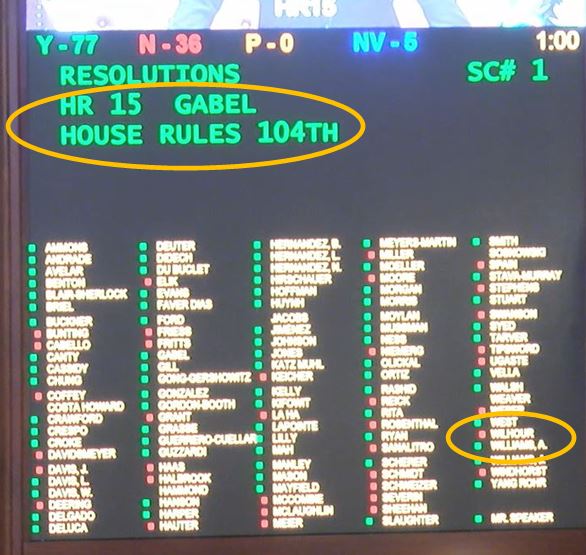The first vote cast by Rep. Blaine Wilhour was to vote NO on the proposed “House Rules” proposed in HR 15. The little-known Rules that control the legislative process in Illinois were voted on Thursday in the Illinois House of Representatives. Adopting a set of procedural rules to govern the House for the next two years is one of the most important votes a legislator will cast.

The Rules for the 104th General Assembly were drafted by the Democrat supermajority with no input from the Republican minority. These Rules will govern the House of Representatives for the next two years. House Republicans did propose reasonable changes that would increase accountability and transparency; however, the proposal was rejected by the supermajority.
More egregiously, the Rules are designed to give ultimate authority to the Speaker of the House instead of the legislative body. The new Rules, as in the past, give the Speaker powers to define the number of committees and their legislative makeup. Because committee chairpersons receive an increase in pay, often large numbers of committees are created to ensure the greater number of chairpersons can owe their allegiance to the Speaker who makes the appointments.
The Rules also dictate which bills see the light of day, specifically, whether the legislation will receive a public hearing in a standing committee or die in the Rules Committee without one. We’ve seen it with legislation dealing with gerrymandering and terms limits, among other initiatives.
We’ve also witnessed the Democrat majority breaking the Rules. Last year, in the final hours of the legislative session, the Speaker allowed lawmakers to vote three times on one piece of legislation to raise nearly one billion dollars in taxes. The bill passed on the third vote after failing twice before. The Rules only allowed for two votes.
What’s more, the Rule-making process is designed to prevent the minority from holding the supermajority accountable. At the same time, the Rules stop the supermajority caucus from being able to hold the Speaker accountable.
Yet this week, all members of the Democrat supermajority voted to implement the Rules that will cede their power to one man. After former Speaker Michael Madigan’s long reign of power was ended, Emanuel “Chris” Welch took over as Speaker. During his first inaugural address after taking the Speaker’s gavel, he said it was a “New Day” in Illinois.
Unfortunately, Speaker Welch went back on his promise to turn the page to a “New Day”, and the House Rules that Madigan put in place are the same Rules that the Illinois House is operating under today. It’s a classic case of, “Meet the new boss, same as the old boss.”
